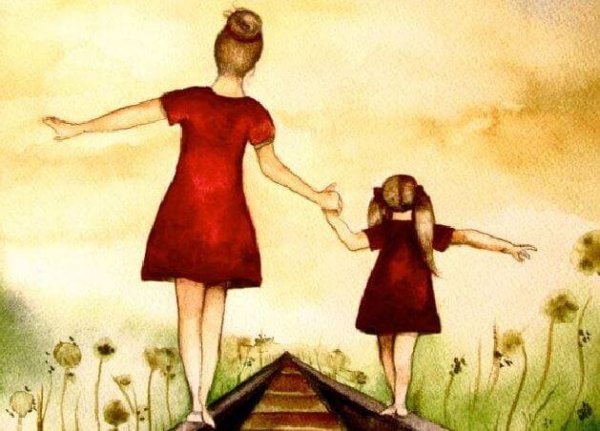When a Mother Ignores Her Baby

In the nine months that a baby grows in the womb, it lives in a protective and secure environment, which is very different from the outside world that awaits. When the baby is born, it encounters a world full of stimuli, where it depends completely on the mother’s care and attention in these early stages of life.
The first two years of life make up the most sensitive period of growth, because that’s when the foundations are laid for development into adulthood. This period is crucial at the neurophysiological level, as all the neural connections and functions are being set during this time.
Research has shown how important attention, love, and affection from the mother, as well as caregivers in general, are in the first stages of a baby’s development.
The affection that babies receive through physical contact is a basic necessity that helps them feel safe and protected. This will shape their personality, their manner of relating to the world, and their cognitive development. A lack of affection and stimulation during the first two years of life can seriously affect their cerebral development and future growth.
The role of the mother in the security of the baby
Babies are born with a repertoire of behaviors to help them capture the attention of their mother. They learn to use crying, smiling, babbling, and various other strategies that will help them bond with their attachment figures. This instinctive energy is utilized as a method of survival.
“Nevertheless for a person to know that an attachment figure is available and responsive gives him a strong and pervasive feeling of security, and so encourages him to value and continue the relationship.”
-John Bowlby-

Depending on the mother’s responses to the baby’s attempts at bonding, it will continue exploring to get the affection it needs. When it doesn’t receive that affection no matter what it does, it becomes irritated, nervous, disoriented, and fearful.
It’s easy to appreciate the way babies behave towards their mothers. All of the mother’s emotional expression is recognized by the baby, who sensitively captures everything she conveys.
Attachment formation
The emotional bond that children establish with their parents is considered to be their first experience in attachment formation. What is the importance of attachment formation? The type of attachment that a child develops towards its caregivers will bring it emotional security, which will structure their personality.
Bowlby, who developed the theory of attachment, said the following of attachment behavior: “Attachment behaviour is any form of behaviour that results in a person attaining or maintaining proximity to some other dearly identified individual who is conceived as better able to cope with the world. It is most obvious whenever the person is frightened, fatigued, or sick, and is assuaged by comforting and caregiving. At other times the behaviour is less in evidence.”

Basically, we can talk about attachment as the tendency to establish strong emotional bonds with certain people. Particularly in early childhood, the experiences with the mother are recorded as a reference for future responses to everyone else with whom the child maintains an emotional bond.
The basic functions of attachment are security, emotional regulation, and survival. It allows us to move away from our secure base, to explore the world despite our fears, and to collect the knowledge and resources we need to manage our emotions and turn guilt into responsibility.
Therefore, the relationship between the baby and the mother is crucially important to the development of future emotional relationships. In adulthood, we tend to follow certain relationship patterns, which can be best observed in romantic relationships.

Strengthening bonds
The way we interact with people depends on the type of attachment that we developed during childhood (secure, ambivalent, avoidant, or disoriented).
Our willingness to interact with other people shapes the way we bond with them. Distrust, possessiveness, anxiety and fear of abandonment, complacency, and a lack of assertiveness can result from difficulties in relating to other people. Different fears can also result: fear of commitment, fear of deep relationships, and fear of emotional vulnerability.
All of these behaviors have to do with our attachment style and how our personalities developed. These are tendencies that can be challenged as we become adults. It is possible and desirable to find our own ways of bonding with people without causing distress or anxiety.
As adults, we’re able to take responsibility for our behavior and the way we relate to others, which involves constant learning and requires awareness, so that we don’t fall into self-deception, guilt, and isolation.
We can choose blame our parents for the attachment style we developed during childhood, or we can learn from every relationship and bond that we maintain and make them more satisfying and enjoyable. You decide.
In the nine months that a baby grows in the womb, it lives in a protective and secure environment, which is very different from the outside world that awaits. When the baby is born, it encounters a world full of stimuli, where it depends completely on the mother’s care and attention in these early stages of life.
The first two years of life make up the most sensitive period of growth, because that’s when the foundations are laid for development into adulthood. This period is crucial at the neurophysiological level, as all the neural connections and functions are being set during this time.
Research has shown how important attention, love, and affection from the mother, as well as caregivers in general, are in the first stages of a baby’s development.
The affection that babies receive through physical contact is a basic necessity that helps them feel safe and protected. This will shape their personality, their manner of relating to the world, and their cognitive development. A lack of affection and stimulation during the first two years of life can seriously affect their cerebral development and future growth.
The role of the mother in the security of the baby
Babies are born with a repertoire of behaviors to help them capture the attention of their mother. They learn to use crying, smiling, babbling, and various other strategies that will help them bond with their attachment figures. This instinctive energy is utilized as a method of survival.
“Nevertheless for a person to know that an attachment figure is available and responsive gives him a strong and pervasive feeling of security, and so encourages him to value and continue the relationship.”
-John Bowlby-

Depending on the mother’s responses to the baby’s attempts at bonding, it will continue exploring to get the affection it needs. When it doesn’t receive that affection no matter what it does, it becomes irritated, nervous, disoriented, and fearful.
It’s easy to appreciate the way babies behave towards their mothers. All of the mother’s emotional expression is recognized by the baby, who sensitively captures everything she conveys.
Attachment formation
The emotional bond that children establish with their parents is considered to be their first experience in attachment formation. What is the importance of attachment formation? The type of attachment that a child develops towards its caregivers will bring it emotional security, which will structure their personality.
Bowlby, who developed the theory of attachment, said the following of attachment behavior: “Attachment behaviour is any form of behaviour that results in a person attaining or maintaining proximity to some other dearly identified individual who is conceived as better able to cope with the world. It is most obvious whenever the person is frightened, fatigued, or sick, and is assuaged by comforting and caregiving. At other times the behaviour is less in evidence.”

Basically, we can talk about attachment as the tendency to establish strong emotional bonds with certain people. Particularly in early childhood, the experiences with the mother are recorded as a reference for future responses to everyone else with whom the child maintains an emotional bond.
The basic functions of attachment are security, emotional regulation, and survival. It allows us to move away from our secure base, to explore the world despite our fears, and to collect the knowledge and resources we need to manage our emotions and turn guilt into responsibility.
Therefore, the relationship between the baby and the mother is crucially important to the development of future emotional relationships. In adulthood, we tend to follow certain relationship patterns, which can be best observed in romantic relationships.

Strengthening bonds
The way we interact with people depends on the type of attachment that we developed during childhood (secure, ambivalent, avoidant, or disoriented).
Our willingness to interact with other people shapes the way we bond with them. Distrust, possessiveness, anxiety and fear of abandonment, complacency, and a lack of assertiveness can result from difficulties in relating to other people. Different fears can also result: fear of commitment, fear of deep relationships, and fear of emotional vulnerability.
All of these behaviors have to do with our attachment style and how our personalities developed. These are tendencies that can be challenged as we become adults. It is possible and desirable to find our own ways of bonding with people without causing distress or anxiety.
As adults, we’re able to take responsibility for our behavior and the way we relate to others, which involves constant learning and requires awareness, so that we don’t fall into self-deception, guilt, and isolation.
We can choose blame our parents for the attachment style we developed during childhood, or we can learn from every relationship and bond that we maintain and make them more satisfying and enjoyable. You decide.
This text is provided for informational purposes only and does not replace consultation with a professional. If in doubt, consult your specialist.







